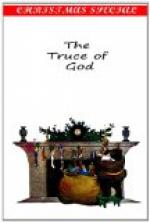This thrilling announcement called forth more than one cry from the lips of the trembling listeners. To increase the panic, a groom burst into the room, and whispered something into the Lady Margaret’s ear that made her start and turn pale as marble. Awhile she sat motionless and apparently sinking. But it was not long before her weakness disappeared, and her face assumed a serene, undaunted expression that imparted new hope to those who were sobbing about her. The wailing was hushed as she rose and said, calmly and without faltering:
“We shall probably be attacked in a few hours by an inferior force. Let us pray to God that we may be able to defeat their malice.”
In uttering this she had fallen upon her knees, and the rest of the group, imitating her example, knelt beside her. When that solemn and fervent prayer was over, the voice of the gray palmer was again heard, as he cried:
“If any man here can still hurl stone, or thrust spear, let him follow me to the walls!”
About six, in whom age had not quenched the fire or strength of youth, and as many beardless youths, sprang up at the call, and accompanied the speaker out of the room.
Exclusive of this new force, the defenders of the castle were not more than twenty, yet so admirable were its defences that they might hold in check an attacking party of more than a hundred. The warder and his men were grouped together at the main gate, straining their eyes against the horizon, where the smoke of some cottages indicated the presence of the foe, when the palmer advanced and asked permission to assist them. This was readily granted, and the recruits were soon supplied with defensive armor and the usual weapons. The palmer wore his headpiece over his hood, and, with his breast-plate over his gown, which, tucked up with more than John Chandos’ prudence, but half revealed the thigh-pieces beneath it, he was equally conspicuous and grotesque.
A body of mounted men could now be plainly seen rapidly advancing. They no longer stayed to desolate the humble dwellings in their path, but swept on against the stately castle which seemed to bid them defiance. The Lady Margaret was now among the soldiers, animating them to resistance. Guided by the palmer, to whom the command had been tacitly yielded, the men were busily engaged in carrying large stones up to the battlements over the archway.
“Who are our assailants?” asked the maiden, as with a firm step she mounted the wall.
The advancing troops rode up to the raised drawbridge, displaying as they came the picturesque costume and swarthy face of the Bohemian marauder. The Lady Margaret’s cheek was now deeply flushed, and the haughty spirit of her race flashed within her eyes and curled her lip in scorn.
“They are not a hundred,” she said to the palmer, who stood at her side.
In reply, the palmer pointed to a body of men-at-arms, then emerging from a clump of trees in which they had been hitherto concealed. Her color fell at the sight of this new force—yet only for a moment: the next instant her cheek resumed its glow. This column, about a hundred strong, approached slowly and cautiously, as if expecting a sally, until they too had reached the moat.




